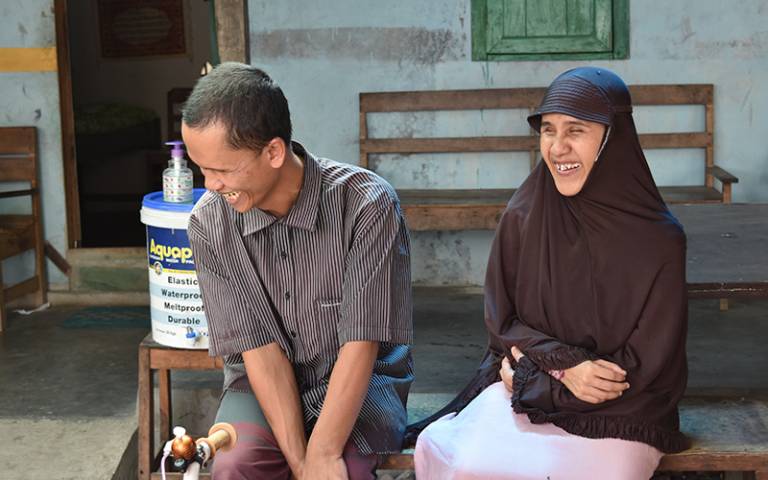Video output launched from DPU co-led research project 'AT2030: Community led solutions'
30 November 2020
The video, 'Understanding the impact of COVID-19 on disabled people's daily lives' was produced by AT2030 Sub-Programme 9 partner Kota Kita in two Indonesian cities alongside the DPU

As we prepare to celebrate International Day of Persons with Disabilities as part of the action research “AT2030: Community led solutions”, we reflect on this year’s theme, “Building Back Better: toward a disability-inclusive, accessible and sustainable post COVID-19 World”.
From March to July, the Indonesian NGO Kota Kita documented the stories of 43 people with a range of disabilities in two cities — Banjarmasin, South Kalimantan and Solo, Central Java — to learn how the pandemic has affected their daily lives.
This video is part of the research on the impact of the COVID-19 pandemic on persons with disabilities in Indonesia. The pandemic has exacerbated many pre-existing disadvantages, ranging from disruptions to livelihood opportunities and accessibility, to limited social interactions. In this video, we hear four short stories from disabled residents: Susiana and Mispan, Hari Sawitri, Galih and Dela, as well as Entok Darmanto from the Indonesian City of Surakarta, on remaining resilient and how their lives have changed during the pandemic.
Story 1: Livelihoods (Susiana and Mispan)
“Due to the COVID-19 outbreak and the social distancing measures applied, I had no clients so my income as a masseuse dropped significantly. No patients come to my house. There are no community meetings or religious events, which also means there are no opportunities for promoting my services.” - Susiana, masseuse in Solo
- The pandemic has affected the economic lives of most Indonesians, particularly persons with disabilities who are more likely to have low-wage jobs, often in the informal sector, and were barely making ends meet prior to the pandemic. For example, of 1,167 persons with disabilities living in Solo, around 60% are not in work. And the 30% that have jobs, the majority earn less than 110 USD per month (Solo City: A Disability-Inclusive City profile, 2018).
- People with visual impairments who often work as masseurs - such as Susiana and Mispan - have lost their customers. This has directly affected their ability to cover monthly expenses during periods of social restrictions. Limited skills and job opportunities put them at greater risk.
Story 2: Health and Access to Therapy and Treatment (Hari Sawitri and her son)
“I used to take my son to see a therapist twice a week on Monday and Wednesday to have occupational therapy and speech therapy. During this pandemic however, I can no longer take my son into the hospital to see his therapist as it is too risky to do so.” - Hari Siswanti, mother of a child with ADHD
- Elderly and persons with disabilities who need regular treatment or special needs treatment faced challenges to adapt with the situation, as most of the health facilities had to adjust to the current situation
- Consequently, Hari Siswati, a mother of a child who has ADHD, has had to act as a therapist to her son by merely relying on the experiences she received witnessing her son’s therapy sessions and learning through the internet.
Story 3: Access to Education (Galih and Dela)
Schools and universities have paused face-to-face learning during the pandemic and are pushed to continue the learning process online. In Indonesia, the sudden transition to online classes has burdened many parents with additional costs to provide internet access. It has also been challenging for students with hearing impairments, such as Galih and Dela, to participate during their online classes, mostly due to limited access to sign language interpreters.
Story 4: Social Interaction (Entok Darmanto)
All social interactions have been limited as a consequence of the lockdown and social distancing measures. It has been challenging for the DPOs (disabled people’s organisation) to organise events in the community, as all their activities were cancelled during the pandemic.
The action research project ‘AT2030 Community Led Solutions’ is led by DPU’s Julian Walker. The video was produced by Nina Asterina (Kota Kita), Vanesha Tio Manuturi (Kota Kita) and Ignacia Ossul (UCL).
View the video on our YouTube channel.
 Close
Close

